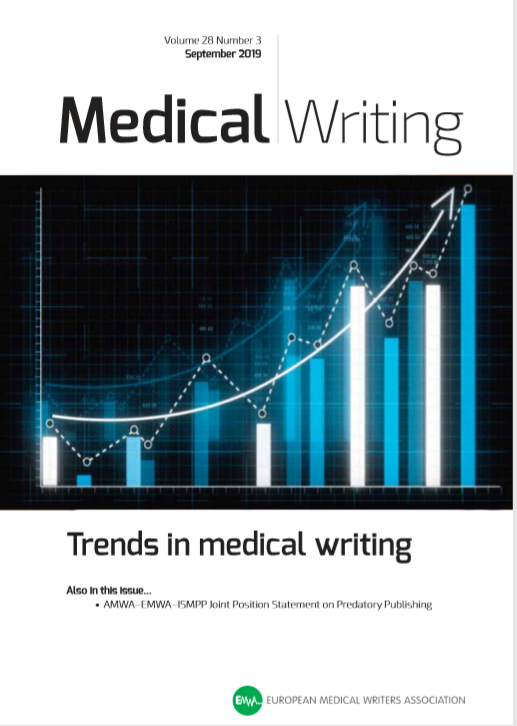
Volume 28, Issue 3 - Trends in medical writing
Predatory publishing – what medical communicators need to know
Authors: Andrea Bucceri, Peter Hornung, Thomas M. Schindler
Abstract
The rise of ”predatory journals”, also known as pseudo-scientific journals, poses a risk to the integrity of science and therefore medical communicators need to know about their practices. Upon receipt of a publication fee, predatory journals publish manuscripts regardless of their scientific merit, very often without any peer review, and without providing editorial services. To maximise profit, such journals disregard all aspects of scientific integrity and foster the dissemination of bad and bogus science, lobby materials, and conspiracy theories. Publishing in predatory journals can have dire consequences for authors, their careers, and the reputation of their institutions. Medical communicators can help authors avoid falling prey to predatory publishers.
 Download the full article
Download the full article
References
- Dossier: Das Geschäft mit der Wissenschaft, Norddeutscher Rundfunk, NDR. 2019 [cited 2019 Jun 14]. Available from: https://www.ndr.de/nachrichten/ investigation/Dossier-Das-Geschaeft-mitder- Wissenschaft,fakesciencedossier 100.html.
- Gastroenterology & Endoscopy News, Wysong P. Beware predatory journals – more than 40 target gastroenterology. 15 April 2019 [cited 2019 Apr 15]. Available from: https://www.gastroendonews.com/In-the- News/Article/04-19/Beware-Predatory- Journals%E2%80%94-More-Than-40- Target-Gastroenterology/54558.
- Bauer P, Krause T, Kropshofer K, Langhans K, Wagner L. Das Scheingeschäft. Süddeutsche Zeitung Magazin. 11 July 2018 [cited 2019 Jun 1]. Available from: https://projekte.sueddeutsche.de/artikel/ wissen/angriff-auf-die-wissenschafte398250/? reduced=true.
- Kolata G. The price for ‘predatory’ publishing? $50 million. New York Times. 3 April 2019 [cited 2019 Jun 1] Available from: https://www.nytimes.com/ 2019/04/03/science/predatory-journalsftc- omics.html.
- Dyer O. US consumer agency wins $50m order against predatory publisher OMICS. BMJ. 2019;365:l1639.
- Laakso M, Welling P, Bukvova H, Nyman L, Björk B-C, Hedlund T. The development of open access journal publishing from 1993 to 2009. PLoS ONE. 2011;6(6): e20961.
- Rabesandratana T. European funders detail their open-access plan. Science 2018;362(6418):983.
- Schiltz M. Science without publication paywalls: cOAlition S for the realisation of full and immediate Open Access. PLoS Biol. 2018 Sep 4;16(9):e3000031.
- Hunter P. A DEAL for open access. EMBO Rep. 2018;19, e46317.
- Baker EF, Iserson KV, Aswegan AL, Larkin GL, Derse AR, Kraus CK and the American College of Emergency Physicians Ethics Committee. Open access medical journals: promise, perils, and pitfalls. Acad Med. 2019;94(5):634–9.
- Shamseer L, Moher D, Maduekwe O, et al. Potential predatory and legitimate biomedical journals: can you tell the difference? A cross-sectional comparison. BMC Med. 2017;15:28.
- Clark J, Smith R. Firm action needed on predatory journals. BMJ 2015;350:h210.
- Shen C, Bjork B-C. “Predatory” open access: A longitudinal study of article volumes and market characteristics. BMC Med. 2015;13:230.
- Manca A, Martinez G, Cugusi L, Dragone D, Dvir Z, Deriu F. The surge of predatory open-access in neurosciences and neurology. Neuroscience. 2017 Jun 14; 353:166–73.
- Bolshete P. Analysis of thirteen predatory publishers: a trap for eager-to-publish researchers, Current Med Res Opin. 2018;34(1):157–62.
- Butler D. Sham journals scam authors. Nature. 2013;495(7442):421–2.
- Dadkhah M, Borchardt G. Hijacked journals: an emerging challenge for scholarly publishing. Aesth Surg J. 2016;36(6):739–41.
- Skeptical Raptor. Another anti-vaccine article – bad journal, bad data. 1 Feb 2017 [cited 2019 June 20]. Available from: https://www.skepticalraptor.com/ skepticalraptorblog.php/another-antivaccine- article-bad-journal-bad-data/.
- Readfearn G.Murky world of ‘science’ journals a new frontier for climate deniers. The Guardian. 28 Jan 2018 [cited 2019 Jun 20]. Available from: https://www.theguardian.com/ environment/planet-oz/2018/jan/24/ murky-world-of-science-journals-a-newfrontier- for-climate-deniers.
- Edie AH, Conklin JL. Avoiding predatory journals: quick peer review processes too good to be true. Nurs Forum. 2019 Jul;54(3):336–9.
- Fernandez-Llimos F. Open access, predatory publishing and peer-review. Pharm Pract (Granada). 2014;12(1):427.
- Johnson R, Watkinson A, Mabe M. The STM Report - An overview of scientific and scholarly publishing 2018. Oxford (UK): International Association of Scientific, Technical and Medical Publishers. Available from: https://www.stmassoc. org/2018_10v04_STM_Report_ 2018.pdf.
- Think.Check.Submit Checklist, choose the right journal for your research. 2019 [cited 2019 Jun 20] Available from: https://thinkchecksubmit.org/.
- The Ottawa Hospital Research Institute, Centre for Journalology. How to detect a potential predatory/deceptive journal. [cited 18 August 2019] Available from: http://www.ohri.ca/journalology/docs/ How%20to%20detect%20a%20predatory %20checklist.pdf.
- Laine C, Winker MA. Identifying predatory or pseudo-journals. Biochem Med (Zagreb). 2017;27(2):285-291.
- Clarivate Analytics. Journal Citation Reports 2018. 2019 [cited 2019 Jun 20] Available from: https://clarivate.com/ blog/science-research-connect/the-2018- jcr-release-is-here/.
Search
Articles
Links
Editoral Board
Editor-in-Chief
Co-Editors
Senior Editor
Victoria White
Managing Editor
Alicia Brooks Waltman
Associate Editors
Section Editors
AI/Automation
Biotechnology
Digital Communication
EMWA News
Freelancing
Gained in Translation
Getting Your Foot in the Door
Good Writing Practice
Pablo Izquierdo / Alison McIntosh
In the Bookstores
Publications
Medical Communications/Writing for Patients
Medical Devices
My First Medical Writing
News from the EMA
Pharmacovigilance
Regulatory Matters
Regulatory Public Disclosure
Louisa Ludwig-Begall / Sarah Kabani
The Crofter: Sustainable Communications
Veterinary Writing
Editors Emeritus
Layout Designer
Chris Monk
 Visit the EMWA website
Visit the EMWA website